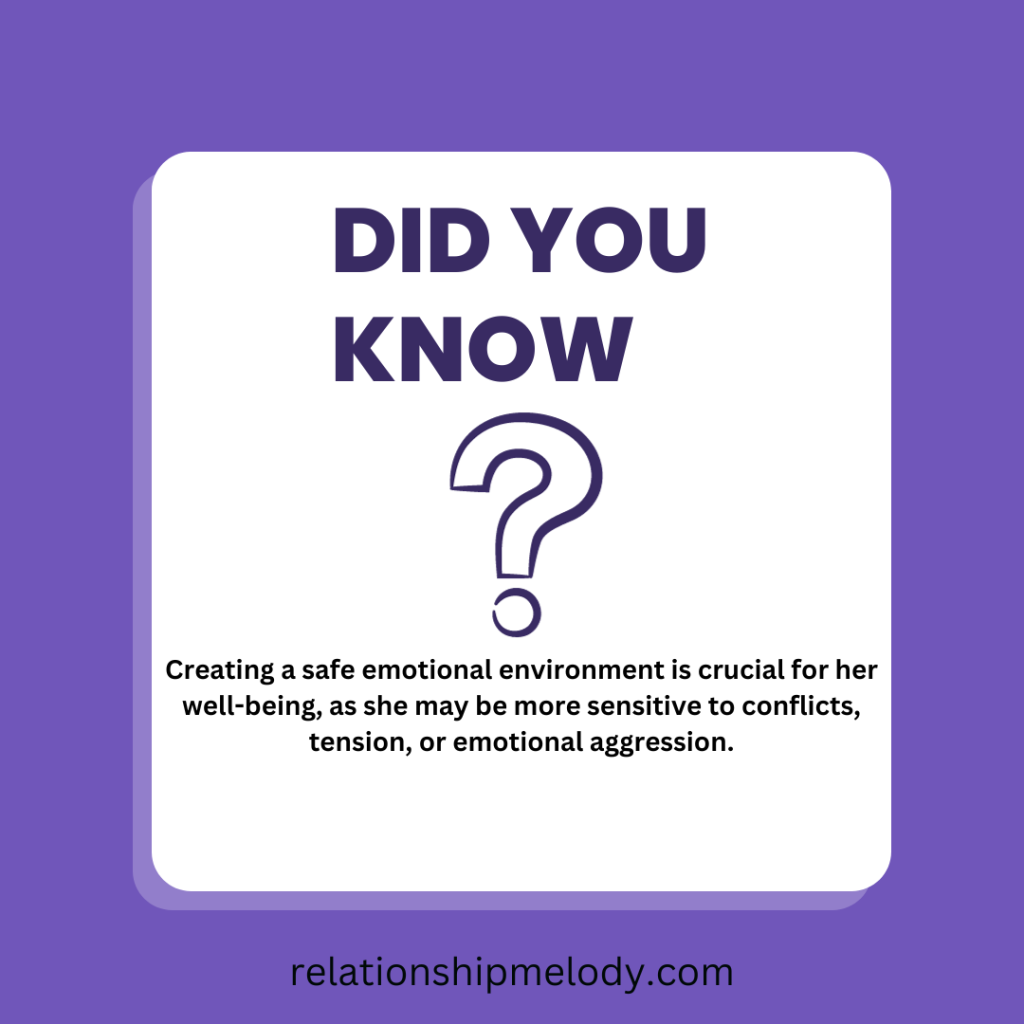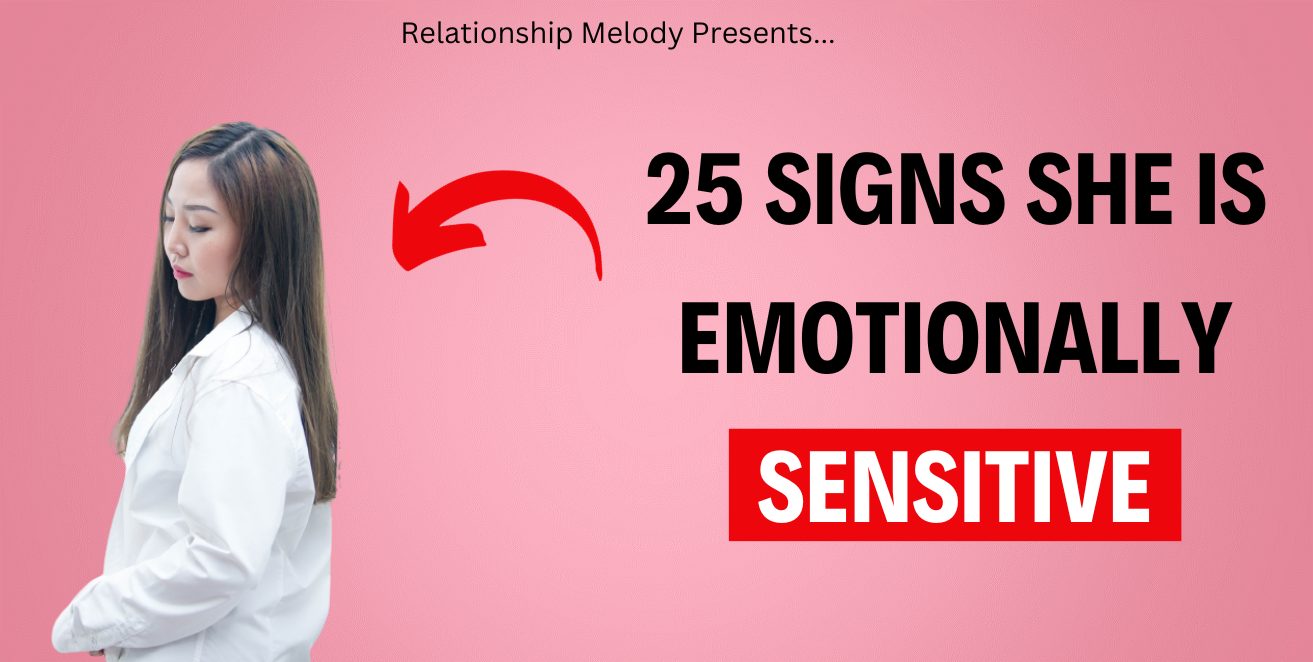25 Signs She Is Emotionally Sensitive
Emotional sensitivity is a trait that affects how individuals perceive and respond to emotions, both their own and others.
While being emotionally sensitive can be a beautiful aspect of one’s personality, it can also present challenges in navigating relationships and daily life.
In this blog post, we will explore 25 signs that may indicate she is emotionally sensitive.
Understanding these signs can help foster empathy, compassion, and effective communication when interacting with an emotionally sensitive person.
Remember, sensitivity is not a flaw but rather a unique characteristic that requires understanding and support.
25 Signs She Is Emotionally Sensitive
These are the 25 signs that you need to know.
Sign #1: Heightened Emotional Reactions:
She may display intense emotional reactions to situations that others may perceive as minor, indicating a heightened sensitivity to emotional stimuli.
Sign #2: Empathetic Nature:
An emotionally sensitive person tends to be highly empathetic, easily picking up on and experiencing the emotions of others, sometimes even to an overwhelming extent.
Sign #3: Intuitive Understanding:
She often has a keen intuitive understanding of others’ emotions, effortlessly sensing their moods, needs, and desires, even without explicit communication.
Sign #4: Deep Emotional Connection:
Building deep emotional connections is a priority for her, seeking meaningful and authentic relationships based on emotional intimacy and understanding.
Sign #5: Overwhelm in Crowded or Noisy Environments:
She may experience discomfort or overwhelm in crowded or noisy environments due to the heightened sensitivity to external stimuli.
Sign #6: Vulnerability to Criticism:
An emotionally sensitive person may be more vulnerable to criticism, taking it personally and feeling deeply hurt by negative feedback or perceived judgment.
Sign #7: Strong Affinity for Nature and Art:
She may have a strong affinity for nature and art, finding solace and emotional resonance in natural landscapes, artistic expressions, and creative outlets.
Sign #8: Need for Emotional Safety:
Creating a safe emotional environment is crucial for her well-being, as she may be more sensitive to conflicts, tension, or emotional aggression.

Sign #9: Difficulty Setting Emotional Boundaries:
She may struggle with setting emotional boundaries, often merging her emotions with others and finding it challenging to separate their feelings from her own.
Sign #10: Intense Empathic Distress:
She may experience profound distress when witnessing the pain or suffering of others, feeling an overwhelming urge to help and provide comfort.
Sign #11: Heightened Sensitivity to Criticism:
An emotionally sensitive person may be acutely sensitive to criticism, perceiving even constructive feedback as a personal attack, which can trigger feelings of self-doubt and inadequacy.
Read more like this: signs she is emotionally detached
Sign #12: Emotional Exhaustion:
She may be prone to emotional exhaustion due to the intense processing and absorption of emotions, requiring regular periods of rest and self-care.
Sign #13: Tendency to Take Things Personally:
She may have a tendency to take things personally, internalizing comments or actions even if they were not intended to be hurtful or directed at her.
Sign #14: Strong Reaction to Rejection:
An emotionally sensitive person may experience a profound reaction to rejection, feeling deeply hurt and struggling to bounce back from perceived emotional setbacks.
Sign #15: Difficulty Handling Conflict:
She may find it challenging to navigate conflicts, becoming overwhelmed by the emotional intensity and struggling to express her thoughts and feelings effectively.
Sign #16: Need for Processing Time:
An emotionally sensitive person often requires additional time to process emotions, seeking solitude or quiet moments to reflect, recharge, and regain emotional equilibrium.
Sign #17: Heightened Awareness of Nonverbal Cues:
She may possess a heightened awareness of nonverbal cues, picking up on subtle changes in facial expressions, body language, and tone of voice.
Sign #18: Profound Emotional Empathy:
She is likely to exhibit deep emotional empathy, feeling an authentic connection with others’ emotional experiences and offering genuine support and understanding.
Sign #19: Avoidance of Conflict:
Due to the aversion to emotional discomfort, an emotionally sensitive person may avoid conflict, sometimes at the expense of asserting her needs or expressing her true feelings.
Sign #20: Prone to Overthinking:
She may be prone to overthinking and ruminating, replaying conversations and events in her mind, analyzing emotions, and searching for deeper meanings.
Sign #21: Deep Appreciation for Beauty:
An emotionally sensitive person often has a profound appreciation for beauty in all its forms, recognizing and being moved by the intricate details and emotional depth in art, music, and nature.
Sign #22: Emotional Influence on Physical Well-being:
Her emotions can significantly impact her physical well-being, with stress, anxiety, or sadness manifesting as physical symptoms such as headaches, stomachaches, or fatigue.
Sign #23: Heightened Intuition:
She may possess a heightened sense of intuition, relying on gut feelings and inner guidance to navigate situations and make decisions.
Sign #24: Emotional Resilience:
Contrary to misconceptions, emotional sensitivity does not equate to fragility.
Many emotionally sensitive individuals develop remarkable emotional resilience, demonstrating strength and perseverance in the face of challenges.
Sign #25: Creative Expression:
Emotionally sensitive individuals often have a natural inclination toward creative expression, utilizing outlets such as writing, painting, or music to channel and process their intense emotions.
Conclusion
Recognizing and understanding the signs of emotional sensitivity can help create an environment of empathy and support for individuals who possess this trait.
By fostering open communication, respecting boundaries, and offering validation, we can build stronger connections and nurture the emotional well-being of emotionally sensitive individuals.
It is essential to appreciate and celebrate the unique perspectives and gifts they bring to our lives, embracing the beauty of emotional sensitivity in all its depth and complexity.
Liked Our Article? Feel Free To Support Us
Our Patreon Page: https://www.patreon.com

Welcome to Relationship Melody! Our website is dedicated to all things on relationships, dating, and love! We are passionate about helping you navigate the ups and downs of love, and our goal is to provide you with valuable insights and information that will make your journey toward a fulfilling relationship smoother and more enjoyable.







